De Nederlandse dichter en schrijver Nachoem Mesoelam Wijnberg werd geboren in Amsterdam op 13 april 1961. Zie ook alle tags voor Nachoem Wijnberg op dit blog.
Naar de markt kijken als naar de sterren en naar de staat als de maan in de herfst
Je staat op een leeg toneel
en moet uitleggen wat je ziet.
Zoals: Ik sta nu in een hoek
van een drukke markt.
Nu kun je tot vertegenwoordiger
van de staat op deze markt benoemd worden.
De opzichter die kan zeggen of de gewichten juist zijn
door ze in zijn handen te nemen.
Want je hebt je nooit vergist
in van wie een gedicht was.
Afspraak
Ach jij, jij
kunt midden op een warme dag
een bad nemen.
Je bent vroeg opgestaan
om op tijd te komen
en je bent alweer terug.
Je hebt geluisterd,
soms met je ogen dicht,
maar niet in slaap.
In alle kleren die je aanhad
was het zo warm
en je wilde zo weinig mogelijk bewegen.
En straks, als
het avond is
drink je thee met wie je
dat afgesproken hebt,
half in de tuin, half ergens anders.
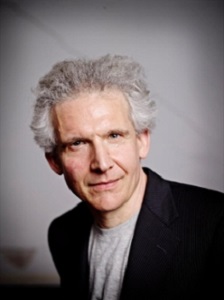
Nachoem Wijnberg (Amsterdam, 13 april 1961)
De Nederlandse dichter K. Michel werd geboren op 13 april 1958 in Tilburg. Zie ook alle tags voor K. Michel op dit blog.
Uit: De stamhouder
“Het Nederlandse vocabulaire van mijn vader was, sinds hij getrouwd was met Mimousse, in korte tijd aanzienlijk verbeterd, en zeker toen ze in de jaren zestig in Brabant gingen wonen, waar mijn vader al snel overstapte op een kolderiek soort zelfbedacht superboerenbroabants, was er, op het eerste gezicht, weinig allochtoons meer aan deze joviale zuiderling te bespeuren. Dat kwam pas aan de oppervlakte als hij thuis de fles ter hand nam en verzonk in zijn eindeloze reservoir aan herinneringen. Maar dan werd het ook vaak meteen heel erg angstaanjagend, zoals die keer dat ik laat thuiskwam en hem in de keuken op verbeten toon vuurbevelen hoorde geven: ‘Zwei Grad nach links, Hohe achtzehn, Feuer! feuer hab ich g’sagt, feuer! Wo bleibt Feuer?! Der Iwan riickt schon vor… ’ Met een verwilderde blik zat hij geheel alleen aan de keukentafel, volkomen van de wereld, vanuit zijn imaginaire, drankdoordesemde waarnemersputje de artillerie naar het doel te geleiden.
Mijn compassie voor mijn vader nam in de loop der jaren af. Ik begreep dat het belangrijk voor hem was dat hij zijn Duitse oorlogshart bij mij zonder gevaar kon luchten, zoals hij op zeker moment steevast elke zondagochtend ging doen. Mimousse vertelde me wel eens dat mijn vader weer schreeuwend en badend in het zweet in het holst van de nacht wakker was geworden omdat allerminst een doekje voor het bloeden. Wat ik toen aanvoelde, zie ik nu, al schrijvend, eindelijk scherp: een vader die niet in mij ge’Interesseerd was en slechts bezeten was door de idee ooit rijker te worden dan de Oude Heer – dan pas zou hij gelukkig kunnen zijn. Een door drie miskramen gefrustreerde stiefmoeder dje mij, bij gebrek aan beter, tot haar levenstaak had verheven en mijn succes in de maatschappij tot graadmeter van haar eigen geluk had gemaakt. Maar dat ze echt van me hield kan ik niet zeggen. Haar liefde gold mijn vader, niet in de eerste plaats het kind dat hij aan een mislukt huwelijk uit een verleden dat zij Wilde uitbannen, had overgehouden.”
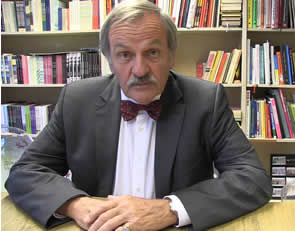
Alexander Münninghoff (Posen, 13 april 1944)
De Schotse, Engelstalige schrijver van Nederlandse herkomst, Michel Faber werd geboren in Den Haag op 13 april 1960. Zie ook alle tags voor Michel Faber op dit blog.
Uit: The Courage Consort
“I was going to say something,” he said.“So say it,” she said.He was quiet, keeping his eyes on the road. In the darkness of the city’s outskirts, there was nothing to see except the tail- lights of other cars in the distance, the endless unfurling roll of tarmac, the giant utilitarian fixtures of the motorway.“God may be disappointed in me for even thinking it,” he said.“Well,” she sighed, “He knows already, so you may as well tell me.”He glanced at her face, to judge what mood she was in as she said this, but the top half of her head, including her eyes, was veiled in a shadow cast by the edge of the windscreen. The bottom half of her face was lunar bright. The sight of her cheek, lips and chin— so intimately familiar to him, so much a part of life as he had known it— made him feel a sharp grief at the thought of losing her.“The world looks nicer with man- made lights,” he said.They drove on in silence. Neither of them could abide the chatter of radio or the intrusion of pre- recorded music. It was one of the many ways they were compatible.“Is that it?” she said.“Yes,” he said. “What I mean is . . . Unspoiled nature is supposed to be the ultimate in perfection, isn’t it, and all the man- made stuff is supposed to be a shame, just cluttering it up. But we wouldn’t enjoy the world half as much if we— man . . . that is, human being…”
(She gave him one of her get- on- with- it grunts.)“ . . . if we hadn’t put electric lights all over it. Electric lights are actu-ally attractive. They make a night drive like this bearable. Beautiful, even. I mean, just imagine if we had to do this drive in total darkness. Because that’s what the natural state of the world is, at night, isn’t it? Total darkness. Just imagine. You’d have the stress of not having a clue where you were going, not being able to see more than a few meters in front of you. And if you were heading for a city— well, in a non- technological world there wouldn’t be cities, I suppose— but if you were heading for a place where other people lived, living there naturally, maybe with a few campfires . . . “
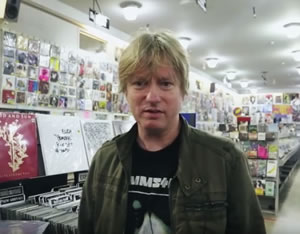
Michel Faber (Den Haag, 13 april 1960)
De Franse schrijver Jean-Marie Gustave Le Clézio werd geboren op 13 april 1940 in Nice. Zie ook alle tags voor Jean-Marie Gustave Le Clézio op dit blog.
Uit: Désert
“Ils sont apparus, comme dans un rêve, au sommet de la dune, à demi cachés par la brume de sable que leurs pieds soulevaient. Lentement ils sont descendus dans la vallée, en suivant la piste presque invisible. En tête de la caravane, il y avait les hommes, enveloppés dans leurs manteaux de laine, leurs visages masqués par le voile bleu. Avec eux marchaient deux ou trois dromadaires, puis les chèvres et les moutons harcelés par les jeunes garçons. Les femmes fermaient la marche. C’étaient des silhouettes alourdies, encombrées par les lourds manteaux, et la peau de leurs bras et de leurs fronts semblait encore plus sombre dans les voiles d’indigo.
Ils marchaient sans bruit dans le sable, lentement, sans regarder où ils allaient. Le vent soufflait continûment, le vent du désert, chaud le jour, froid la nuit. Le sable fuyait autour. d’eux, entre les pattes des chameaux, fouettait le visage des femmes qui rabattaient la toile bleue sur leurs yeux. Les jeunes enfants couraient, les bébés pleuraient, enroulés dans la toile bleue sur le dos de leur mère. Les chameaux grommelaient, éternuaient. Personne ne savait où on allait. Le soleil était encore haut dans le ciel nu, le vent emportait les bruits et les odeurs. La sueur coulait lentement sur le visage des voyageurs, et leur peau sombre avait pris le reflet de l’indigo, sur leurs joues, sur leurs bras, le long de leurs jambes. Les tatouages bleus sur le front des femmes brillaient comme des scarabées. Les yeux noirs, pareils à des gouttes de métal, regardaient à peine l’étendue de sable, cherchaient la trace de la piste entre les vagues des dunes.
Il n’y avait rien d’autre sur la terre, rien, ni personne. Ils étaient nés du désert, aucun autre chemin ne pouvait les conduire. Ils ne disaient rien. Ils ne voulaient rien. Le vent passait sur eux, à travers eux, comme s’il n’y avait personne sur les dunes. Ils marchaient depuis la première aube, sans s’arrêter, la fatigue et la soif les enveloppaient comme une gangue. La sécheresse avait durci leurs lèvres et leur langue. La faim les rongeait. Ils n’auraient pas pu parler. Ils étaient devenus, depuis si longtemps, muets comme le désert, pleins de lumière quand le soleil brûle au centre du ciel vide, et glacés de la nuit aux étoiles figées.”
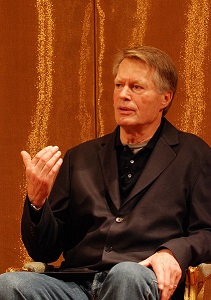
Jean-Marie Gustave Le Clézio (Nice, 13 april 1940)
De Ierse (toneel)schrijver en dichter Samuel Barclay Beckett werd geboren in Foxrock, Dublin op 13 april 1906. Zie ook alle tags voor Samuel Beckett op dit blog.
Uit: Watt
“As there seemed no measure between what Watt could understand, and what he could not, so there seemed none between what he deemed certain, and what he deemed doubtful.
But our particular friends were the rats, that dwelt by the stream. They were long and black. We brought them such tidbits from our ordinary as rinds of cheese, and morsels of gristle, and we brought them also birds’ eggs, and frogs, and fledgelings. Sensible of these attentions, they would come flocking round us at our approach, with every sign of confidence and affection, and glide up our trouserlegs, and hang upon our breasts. And then we would sit down in the midst of them, and give them to eat, out of our hands, of a nice fat frog, or a baby thrush. Or seizing suddenly a plump young rat, resting in our bosom after its repast, we would feed it to its mother, or its father, or its brother, or its sister, or to some less fortunate relative.
It was on these occasions, we agreed, after an exchange of views, that we came nearest to God.”
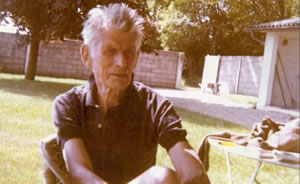
Samuel Beckett (13 april 1906 – 22 december 1989)
De Ierse dichter Seamus Heaney werd op 13 april 1939 te County Derry, Noord-Ierland, geboren. Zie ook alle tags voor Seamus Heaney op dit blog.
Follower
My father worked with a horse-plough,
His shoulders globed like a full sail strung
Between the shafts and the furrow.
The horse strained at his clicking tongue.
An expert. He would set the wing
And fit the bright steel-pointed sock.
The sod rolled over without breaking.
At the headrig, with a single pluck
Of reins, the sweating team turned round
And back into the land. His eye
Narrowed and angled at the ground,
Mapping the furrow exactly.
I stumbled in his hob-nailed wake,
Fell sometimes on the polished sod;
Sometimes he rode me on his back
Dipping and rising to his plod.
I wanted to grow up and plough,
To close one eye, stiffen my arm.
All I ever did was follow
In his broad shadow round the farm.
I was a nuisance, tripping, falling,
Yapping always. But today
It is my father who keeps stumbling
Behind me, and will not go away.
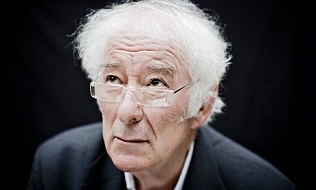
Seamus Heaney (13 april 1939 – 30 augustus 2013)
De Nederlands schrijver en schaker Tim Krabbé werd geboren in Amsterdam op 13 april 1943. Zie ook alle tags voor Tim Krabbé op dit blog.
Uit: De veertiende etappe (De man die bijna)
“Zeven jaar lang was een nietszeggend zinnetje uit een nietszeggend zogenaamd dagboek van Hinault, over zijn niet erg betekenisvolle overwinning in de Ronde van Italië van 1982, in mijn hoofd blijven hangen: ‘Laurent Fignon vertrekt als een raket.’
Waarom zou ik dat onthouden hebben? Toen deze Tour begon heb ik het opgezocht.
Het zinnetje bleek afkomstig uit Hinaults beschrijving van de Proloog van die Giro ’82, een ploegentijdrit. Het hele fragment luidde: ‘Laurent Fignon vertrekt als een raket. Het lijkt wel een motorfiets die jongen. De aflossingen lopen gesmeerd. We houden er een goed tempo in, maar we letten er steeds goed op niemand te lossen.’
Hoewel de drie zinnetjes die op het eerste volgen zeker zo nietszeggend zijn, onthullen ze toch iets van het raadsel dat ik ze onthouden heb. Tussen die regels, net boven de hoorgrens, klinkt een valse noot. Die raket, die motorfiets; ze roepen het beeldop van een verstoorde slagorde. Zeker als meteen daarna zo nodig gezegd moet worden hoe goed de aflossingen wel liepen.”
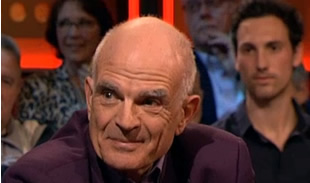
Tim Krabbé (Amsterdam, 13 april 1943)
De Amerikaanse schrijfster Eudora Alice Welty werd geboren in Jackson, Mississippi, op 13 april 1909. Zie ook alle tags voor Eudora Welty op dit blog.
Uit: A Curtain of Green (Petrified Man)
“He’s forty-two too. That looks like a bad age.”
“Who said so, that Mrs. Pike? I bet she’s forty-two,” said Mrs. Fletcher.
“Naw,” said Leota, “Mrs. Pike’s thirty-three, born in January, an Aquarian. He could move his head—like this. A course his head and mind ain’t a joint, so to speak, and I guess his stomach ain’t, either—not yet, anyways. But see—his food, he eats it, and it goes down, see, and then he digests it”—Leota rose on her toes for an instant—”and it goes out to his joints and before you can say ‘Jack Robinson,’ it’s stone—pure stone. He’s turning to stone. How’d you like to be married to a guy like that? All he can do, he can move his head just a quarter of an inch. A course he looks just terrible.”
“I should think he would,” said Mrs. Fletcher frostily. “Mr. Fletcher takes bending exercises every night of the world. I make him.”
“All Fred does is lay around the house like a rug. I wouldn’t be surprised if he woke up some day and couldn’t move. The petrified man just sat there moving his quarter of an inch though,” said Leota reminiscently.
“Did Mrs. Pike like the petrified man?” asked Mrs. Fletcher.
“Not as much as she did the others,” said Leota deprecatingly. “And then she likes a man to be a good dresser, and all that.”
“Is Mr. Pike a good dresser?” asked Mrs. Fletcher sceptically.
“Oh, well, yeah,” said Leota, “but he’s twelve or fourteen years older’n her. She ast Lady Evangeline about him.”
“Who’s Lady Evangeline?” asked Mrs. Fletcher.
“Well, it’s this mind reader they got in the freak show,” said Leota. “Was real good. Lady Evangeline is her name, and if I had another dollar I wouldn’t do a thing but have my other palm read. She had what Mrs. Pike said was the ‘sixth mind’ but she had the worst manicure I ever saw on a living person.”
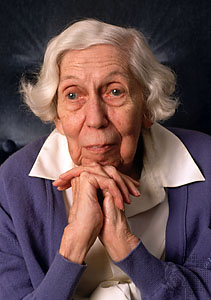
Eudora Welty (13 april 1909 – 23 juli 2001)
Zie voor nog meer schrijvers van vandaag ook mijn twee blogs van 13 april 2014.
